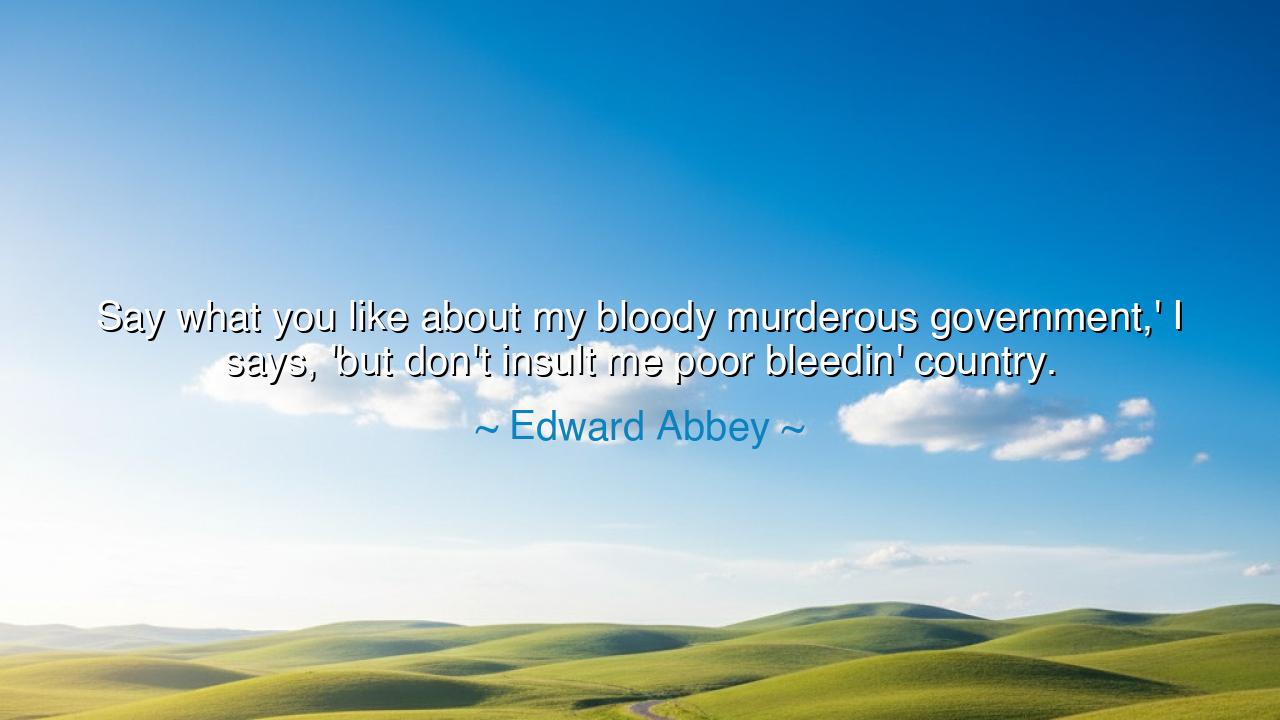
Say what you like about my bloody murderous government,' I says
Say what you like about my bloody murderous government,' I says, 'but don't insult me poor bleedin' country.






When Edward Abbey wrote, “Say what you like about my bloody murderous government,’ I says, ‘but don’t insult me poor bleedin’ country,” he was speaking with the voice of a rebel patriot — the kind of man who loves his homeland fiercely, even as he condemns the corruption of those who rule it. Abbey’s words rise like a storm from the heart of a paradox: the conflict between love of country and contempt for government. To him, the two were not the same. A government could betray its people, waste its beauty, and abuse its power — but the land, the spirit, and the people of the country itself were sacred, beyond the reach of politics. His statement is both a declaration of defiance and a hymn of devotion, a reminder that true patriotism often demands rebellion against authority, not submission to it.
The origin of this quote lies in Abbey’s fierce environmental writings, particularly his novel Good News and essays like those in The Monkey Wrench Gang. Living through the tumult of the mid-20th century — the Vietnam War, the rise of corporate greed, and the destruction of wild lands — Abbey saw a growing gulf between the ideals of America and the behavior of its institutions. His “bloody murderous government” was one that waged war abroad while laying waste to its own wilderness at home. Yet he refused to let that corruption define the country he loved. Abbey’s “poor bleedin’ country” was not the bureaucracy of Washington but the deserts of Utah, the canyons of Arizona, the spirit of ordinary people who lived honestly on the land. His love was not for the flag as symbol, but for the soil as living truth.
In the style of the ancients, one might say Abbey spoke like a prophet standing at the gates of empire, shouting truth to power. His cry echoes through history: “Condemn the kings, but love the kingdom.” He stood in the tradition of men like Socrates, who questioned his own city not out of hatred but out of love for its soul. The government, to Abbey, was the temporal — flawed, transient, and corrupted by greed — but the country, in its essence, was eternal: its mountains, rivers, and people formed the heart of a nation worth defending. His words are a reminder that governments come and go, but the land remains — and so too must our reverence for it.
History gives us countless mirrors of Abbey’s truth. Consider the story of Mahatma Gandhi, who stood against the British government yet loved the spirit of the Indian people and their land beyond all measure. He fought empire not to destroy it, but to reclaim dignity for his countrymen. Or think of Thomas Jefferson, who helped forge the American republic but warned that governments must be bound by the chains of the Constitution, lest they become instruments of tyranny. These figures, like Abbey, understood that loyalty to truth and justice is higher than loyalty to any government. They remind us that to love one’s country is not to worship its rulers, but to guard its conscience.
Abbey’s quote also burns with emotional wisdom — the anguish of one who loves deeply and suffers for that love. His tone is both wounded and proud, as though defending a friend who has been wrongly maligned. “Say what you like about my government,” he says — go ahead, criticize its wars, its hypocrisy, its failures — “but don’t insult my country,” for that country is the home of beauty, of wilderness, of common people trying to live in decency. In those words lies a deeper message: that cynicism toward power must never become contempt for the people or the land itself. Even in rage, one must protect the sacred core of belonging.
This truth applies beyond Abbey’s America — it is universal. Every nation has its duality: the government, with its flaws and ambitions, and the homeland, with its heart and humanity. When we confuse the two, we either fall into blind nationalism or bitter despair. But when we distinguish them, as Abbey did, we recover a purer form of love — one that resists tyranny without losing hope, one that sees beauty even amid ruin. Such love does not flatter; it fights. It does not obey; it endures. It is the love that refuses to surrender its country to the corruption of its rulers.
The lesson of Edward Abbey’s words is this: to love your country truly, you must never worship its government. Love the land, the people, the culture — but do not mistake power for virtue. Governments will fail, leaders will fall, and institutions will decay, but the spirit of a nation — its language, its songs, its landscapes, its humanity — is eternal. To honor that spirit, each person must defend truth, protect beauty, and stand against injustice wherever it appears, even when it comes wearing the flag.
So let his words echo through time as a reminder and a challenge: criticize the state, but cherish the soil. Condemn injustice, but never lose faith in the heart of your homeland. For true patriotism is not obedience — it is stewardship. And those who dare to love their “poor bleedin’ country” enough to speak truth, to fight for its soul, and to protect its beauty — they are the keepers of its freedom, and the guardians of its enduring grace.






AAdministratorAdministrator
Welcome, honored guests. Please leave a comment, we will respond soon